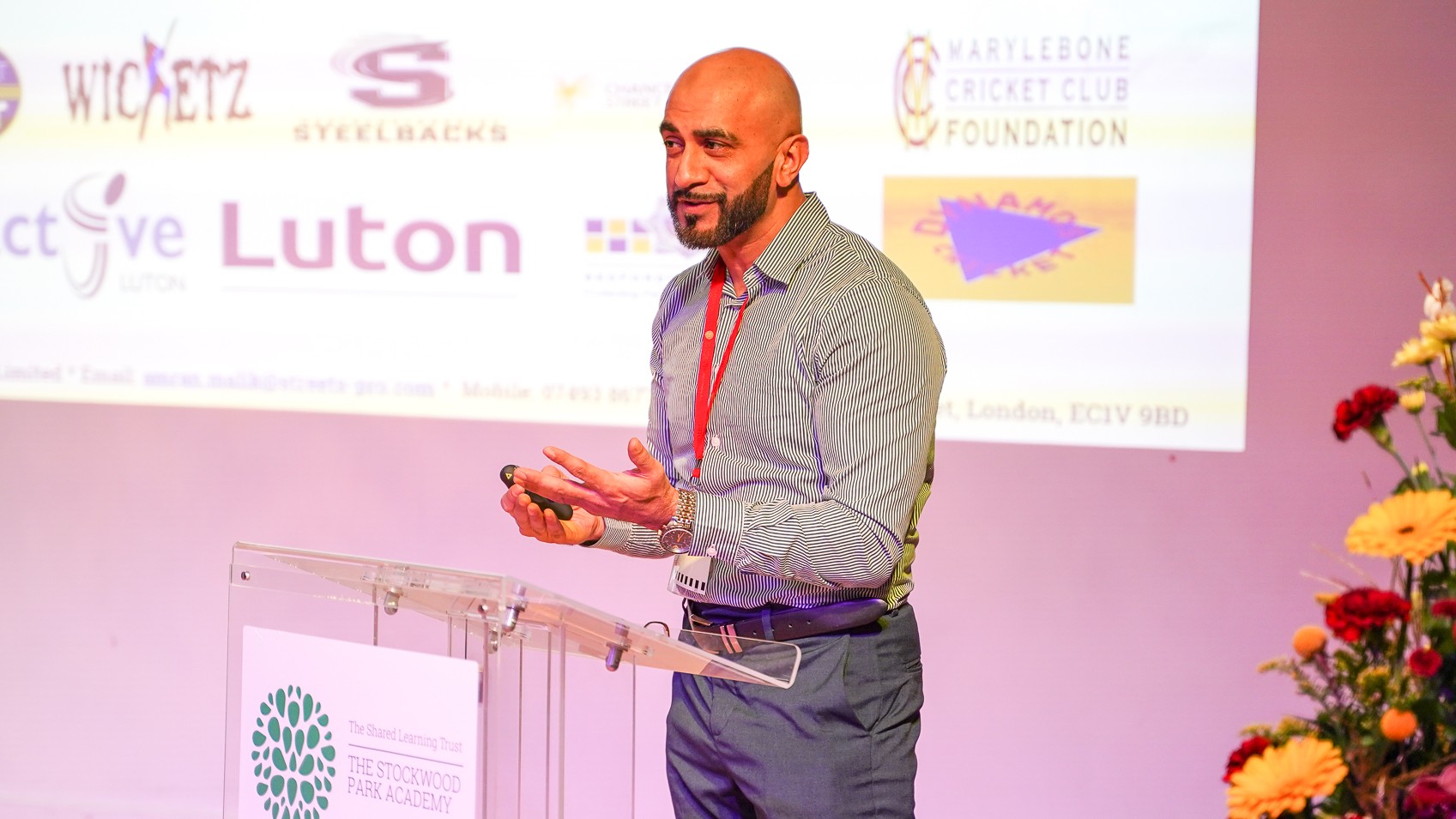Amran Malik is an Urban Sports Sustainability Consultant who works in partnership with the United Nations’ Department of Economic and Social Affairs to accelerate the awareness and implementation of the UN’s 17 Sustainable Development Goals through sports.
There are many different ways we can make cricket more inclusive by attracting people to play this wonderful game and making a lasting difference in their communities.
I’ve been mandated by the United Nations Department of Economic and Social Affairs to accelerate awareness and implementation of the UN’s 17 Sustainable Development Goals through sport. That includes things like reducing poverty and crime, giving people access to education and helping them find jobs.
I first saw the value of cricket in helping to achieve these goals in Luton in 2017 when my sons joined the Lord’s Taverners’ Wicketz programme, and the Development Officer role became available. At that time, Wicketz was the only programme that offered cricket in Luton, mainly softball aimed at primary school age.
Cricket was voted as the most popular sport among young people in a local authority survey, revealing a great appetite for the sport.
Martin Darlow, who was the Chief Executive Officer of Bedfordshire Cricket at the time and now sits on the ECB Board, had built bridges with communities and initiated key programmes to increase the participation and growth of cricket and reduce crime.
Prior to leaving Bedfordshire Cricket he was keen to develop the local infrastructure as Luton Town and Indians Cricket Club were the only club that had a fixed outdoor cricket lane. The rest of the town had hundreds of players and more than 30 teams, but with no outdoor nets.
To continue Martin’s great work and legacy, I drew on my background working in partnership with the British Council in South Asia where I developed a model to bring different programmes and funding streams together. This helped us train young people from 82 towns and cities across Pakistan to assist them into employment.
I took that model, brought it to Luton and added sport. I wanted to work with government bodies like the Department of Culture, Media & Sport (DCMS) and Sport England, local stakeholders and various programmes run by the ECB, Cricket East, MCC, Lord’s Taverners and others. A holistic, multi-collaborative approach.
I think we’re living in a time where people understand the benefits of collaboration, and of working together. It’s common sense. So, by adopting through this new joined-up approach, over five years in partnership with Louise Lee, Executive Principal, The Shared Learning Trust, and Cricket East, we created new ECB Level Four hubs through Luton’s Shared Learning Trust over two campuses at the Stockwood Park and Chalk Hills Academies. These hubs provide access to cricket and an integrated pathway across multiple ages and communities.
Wicketz was a key early stakeholder. The Lord’s Taverners were very supportive in paying for coaching as well as facility costs for some of the clubs.
The ECB’s key hand was through its South Asian Core City Programme originally led by Dave Summers, Diverse Communities Officer. Funding from that programme contributed to non-turf pitches across seven parks across Luton.
The ECB also invested in two dual outdoor lane nets facilities at Lutonians CC and at Luton Town and Indians CC. A new four-lane facility has also gone into one of the secondary schools.
On the coaching front, I was the only South Asian employed coach in 2017. Now we have 44 qualified coaches.
There was only one girl playing the game then. Now we have seven coaches and a standalone women and girls club that’s run by women. The local authority has given the women and girls club their own ground as well.
Thanks to ECB’s Core Cities Programme we’ve seen a massive transformation from both an infrastructure and coaching perspective in Luton over the past five years.
Now, a young person aged five to eight can go to the hubs and do an eight-week All Stars programme or Dynamos if they’re eight to 11. From there they can do the Chance to Shine Street programme, which is a year-round tape ball initiative up to the age of 24. There’s a massive tape ball community in this town and across the country. Or they can go on to Wicketz, which is a more traditional cricket programme from the age of eight to 19.
Our coaches also signpost the most talented players on to the MCC Foundation performance programme. From there, they can go on to the pioneering new Steelbacks Academy sixth form programme we have developed in partnership with Northamptonshire County Cricket Club. So, it’s like a progressive escalator. There’s enough space for everyone. It’s just joining it up. Ultimately, it gives young people the pathways, if they’re good enough, to progress to England eventually.
There are many key people that have made this possible. One of which is Northamptonshire chair, Gavin Warren, who has been a great friend and supporter of the work I have been doing and has visited local events and has provided support both locally, nationally, and internationally to grow the wonderful game of cricket.
The Luton urban challenge was something that Ray Payne, the Chief Executive at Northamptonshire, recognised when I first met with him a year ago. I told him that young people from this town don’t have the money or the parental support to take them around the country to pursue a career in cricket – but they do have the talent. We explored how can we bridge this vacuum, this gap of getting talented cricketers from an urban centre like Luton to be represented in the game.
Ray, the gem that he is, said: “Amran, let’s have a discussion.”
That’s when I got him together with the Shared Learning Trust and they agreed to make this programme happen at no cost to the young people. That’s where the Northamptonshire Steelbacks Academy was born. A first-class county has gone into an urban centre, rather than the urban guys going to a county.
The young people get a wide range of educational options together with an elite-level cricket programme under the leadership of former Northamptonshire Head Coach David Ripley. It’s remarkable. They get to do a coaching support qualification. Throughout the two years, they will also have to do voluntary work on community programmes across the town.
So, not only are they getting education and cricket coaching, but they will also get work experience and qualifications which will act as a safety net, if they don’t get to the top level of the game. They will become more employable and their chances of life success increase. So, the Steelbacks is more than just a talent identification programme.
Everything we do is linked to wider communities and organisations across the town. We’re using sport as a beacon to engage people and tackle and improve social and economic problems in Luton.
For example, we work closely with the local authority, businesses, faith and community centres, the police, the army and others. The end result is the social and economic affairs of Luton have got better.
I piloted a new Link-UP hub programme in partnership with Helen Barnett, Chief Executive Officer, of Active Luton this summer. While a lot of people dream of playing for England, not everyone is going to make it.
So, the Link-Up programme, a collaboration between sports clubs, community organisations, educational institutions, business, and local authorities provides young cricketers with the soft skills to gain employment if a career in sport does not work out, channelling their talents in a positive direction. This includes things like CV writing and interview, telephone, and presentation skills.
We’ve also diversified and adapted our cricket programmes to reach different groups and better meet their needs. For example, to attract more women to cricket, we are piloting an initiative developed by Sohail Raz from Yorkshire Cricket Foundation called Cardio Cricket. Sessions include things like Zumba to help improve public health and finish with some soft play cricket.
We’ve also introduced Combat Cricket in partnership with Storm Gym to engage those who are involved in antisocial behaviour. Sessions start with some MMA to better harness the young people’s energies and also finish with some soft play cricket.
So, what next? To facilitate the massive cricket demand, Luton needs a bespoke Cricket Centre something that ECB have agreed to fully fund.
The seven-lane year-round Cricket Shield facility will accommodate both traditional and non-traditional formats of the game and will act as a talent identification and community development centre. It will be great to expand the Link-Up services we offer to assist and fulfil the communities needs both in cricket and the town’s wider skills development.
Personally, I’ve been commissioned by ECB to support them with a research project on the creation and development of urban hubs.
I’m working with Core Cities nationally to determine common threads in successful community hub development. What if we had every first-class county sowing a seed in an urban centre – an urban talent identification network to run alongside the conventional network?
The county networks are already great – we’ve produced men’s and women’s World Cup winning teams – but to be inclusive, we need to consider urban areas. And how to bridge that gap is exactly what the Northamptonshire Steelbacks Academy is all about.
Now what I believe we need to do is replicate and scale this good practice in Luton nationally. First, we’re expanding Northamptonshire Steelbacks Academy into Peterborough this autumn in partnership with Thomas Deacon Academy. Peterborough is almost like a mirror image of Luton in regard to its challenges and demography. It’s probably where Luton was in 2017.
As I’ve travelled across the country, to the other South Asian Core Cities, I’ve seen very similar situations where there is an appetite to play, but just not the parental support or the financial prowess. If there’s a Steelbacks style academy in the vicinity of every first-class county, I think we might be on to an urban talent identification model which doesn’t replace but complements the current system and makes it more inclusive.
My mandate from the United Nations is to work across all sports. But this is my service to cricket before I move on, making sure that whatever is left behind is sustainable.

